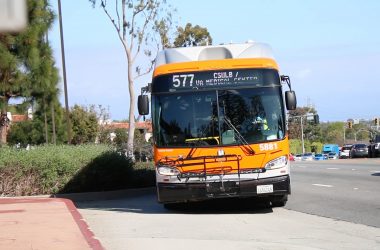The Port of Long Beach reported last week that levels of dangerous pollutants declined for the third year in a row in 2009.
According to the report released June 14, from 2005 to 2009 diesel particulate matter was reduced by 52 percent, nitrogen oxides were down 35 percent and sulfur oxides were reduced 46 percent. These substances threaten public health, explained Robert Friis, chair of health sciences at Cal State Long Beach.
“These substances are potential carcinogens and may exacerbate lung diseases such as asthma,” Friis said. “Reductions in them may lessen the occurrence of lung cancer, other pulmonary diseases, aggravation of heart disease and possibly contribute to lowered mortality.”
In 2006, the Port of Long Beach adopted a master strategy called the Clean Air Action Plan to reduce pollution. The plan includes restrictions on emissions from ships, trucks, trains and other equipment. One of the largest measures is the Clean Trucks Program, which requires almost 10,000 trucks to be replaced or retrofitted to reduce pollution.
“This is great news for the Long Beach community and the entire region,” said Nick Sramek, president of the Long Beach Board of Harbor Commissioners. “Our air quality programs are expanding and delivering better results each year. Trucks, trains and ships are running cleaner than ever before.”
Although the report states that the port is on track to exceed its goals for reducing pollution, the improvements have not happened without criticism. Students on the Cal State Long Beach campus protested against the Clean Trucks Program in December 2009, saying that the program unfairly placed the financial burden of retrofitting the trucks on the drivers.
“If the burden of maintenance remains on the underpaid drivers, as it has been for years, I’m afraid that we will be right back where we were before the Clean Air Action Plan was adopted as new trucks age and are not maintained properly,” said David Petitt, senior attorney with the Natural Resources Defense Council. “That is how we got into the air quality mess in the first place.”
Petitt also said that these improvements happened during a period of economic decline, when truck, ship and train traffic was already down, so the numbers may be falsely inflated. Although the Port reports state that the air quality improvements far outpaced the shipping decline, others caution that air pollution in Long Beach is still a serious problem.
“Despite improvements in the past few years, the Los Angeles basin continues to have one of the worst air pollution levels in the country,” Friis said. “Poor air quality remains a significant public health challenge.”
Friis said the only effective way to improve air quality in Long Beach will be by adopting green technology solutions such as alternative fuels and more public transportation.
Disclaimer: The Daily 49er is not responsible for Postings made on www.daily49er.wpengine.com. Persons commenting are solely responsible for Postings made on this website. Persons commenting agree to the Terms of Use of the website. If Postings do not abide by the Rules of Conduct or Posting Regulations as listed in the Postings Policy, the Daily 49er has all rights to delete Postings as it deems necessary. The Daily 49er strongly advises individuals to not abuse their First Amendment rights, and to avoid language suggestive of hate speech. This site also encourages users to make Postings relevant to the article or other Postings.



